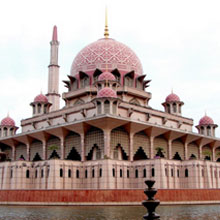Resurrection and judgment
Belief in the "Day of Resurrection", Yawm al-Qiyāmah (Arabic: يوم القيامة) is also crucial for Muslims. They believe the time of Qiyāmah is preordained by God but unknown to man. The trials and tribulations preceding and during the Qiyāmah are described in the Qur'an and the hadith, and also in the commentaries of scholars. The Qur'an emphasizes bodily resurrection, a break from the pre-Islamic Arabian understanding of death.[51]
On Yawm al-Qiyāmah, Muslims believe all mankind will be judged on their good and bad deeds. The Qurʼan in Surat al-Zalzalah describes this as, "So whoever does an atom's weight of good will see it (99:7) and whoever does an atom's weight of evil will see it (99:8)." The Qurʼan lists several sins that can condemn a person to hell, such as disbelief in God (Arabic: كفر kufr), and dishonesty; however, the Qurʼan makes it clear God will forgive the sins of those who repent if he so wills. Good deeds, such as charity, prayer and compassion towards animals,[52][53] will be rewarded with entry to heaven. Muslims view heaven as a place of joy and bliss, with Qurʼanic references describing its features and the physical pleasures to come. Mystical traditions in Islam place these heavenly delights in the context of an ecstatic awareness of God.[54]
Yawm al-Qiyāmah is also identified in the Qur'an as Yawm ad-Dīn (Arabic: يوم الدين), "Day of Religion";[55] as-sāʿah (Arabic: الساعة), "the Last Hour";[56] and al-Qāriʿah (Arabic: القارعة), "The Clatterer"
Predestination
In accordance with the Islamic belief in predestination, or divine preordainment (al-qadā wa'l-qadar), God has full knowledge and control over all that occurs. This is explained in Qur'anic verses such as "Say: 'Nothing will happen to us except what Allah has decreed for us: He is our protector'..."[58] For Muslims, everything in the world that occurs, good or bad, has been preordained and nothing can happen unless permitted by God. According to Muslim theologians, although events are pre-ordained, man possesses free will in that he or she has the faculty to choose between right and wrong, and is thus responsible for his actions. According to Islamic tradition, all that has been decreed by God is written in al-Lawh al-Mahfūz, the "Preserved Tablet
Five pillars
The Pillars of Islam (arkan al-Islam; also arkan ad-din, "pillars of religion") are five basic acts in Islam, considered obligatory for all believers. The Quran presents them as a framework for worship and a sign of commitment to the faith. They are (1) the shahadah (creed), (2) daily prayers (salat), (3) almsgiving (zakah), (4) fasting during Ramadan and (5) the pilgrimage to Mecca (hajj) at least once in a lifetime. Both Shia and Sunni sects agree on the essential details for the performance of these acts




